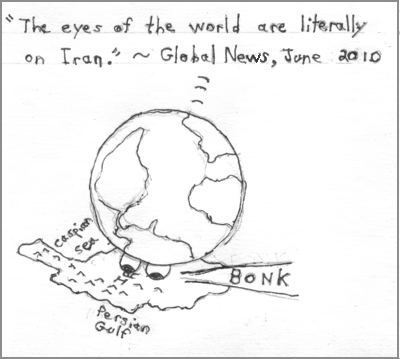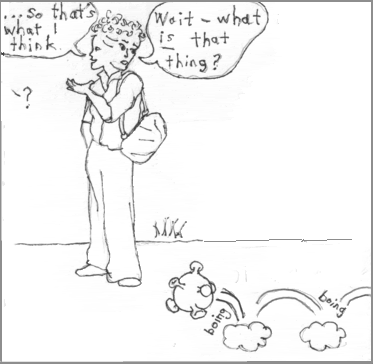Language is for communication. Isn't that obvious? It shouldn't even need to be said. But in fact, it is popular these days to use language for something other than communication. Marketingspeak is meant to lull the reader's brain to sleep with babble that means little, yet is somehow comforting. Meetingspeak and Scholarspeak are meant to make the speaker sound intelligent through the use of polysyllabic, imprecise words that do not make their meaning anywhere near as clear as shorter, simpler words would have done. It appears that as a society, we have largely abandoned the idea that our sentences should make sense. So when common expressions get mangled over time and become nonsense, who's to remark upon it? Other than me, that is.
The language is always changing, of course, and these changes do not always result in nonsense. The word "foundering" has largely been abandoned for the similar-sounding "floundering." Foundering made more sense, but floundering is not altogether nonsensical. One pictures a flounder, out of water, desperately flopping around. On the other hand, when people talk about "flaunting the rules," that's ridiculous, as if rules were a party dress a girl wanted to show off. (The correct word is "flout.")
I, for one, think that language should be used for communication, and hope to turn people back to the path of correct speech through the use of judicious mockery, and, where desirable, cartoons. Here we go.
I could care less
People used to say, "I couldn't care less." It meant they cared very little indeed, or not at all. Now they often say, "I could care less." This should mean that they care somewhat, since it would be possible for them to care less. It could even mean that they do care a fair bit. Yet it is meant to imply a lack of caring, just like the original expression, despite the fact that that's not what the words are saying. This is why people who use this expression tend to sound like idiots.
Party hardy
 I am pretty sure that this expression started out as "party hearty," with a t. But in North America, t's tend to be pronounced as d's, so that "party hearty" and "party hardy" sound the same. And in a society where sense is not expected, it doesn't matter that "party hearty" means "to party with gusto" and "party hardy" means, one can only suppose, "to party in difficult, inclement conditions." So when the expression got written down, "party hardy," whimsically nonsensical and having one letter fewer, won the day.
I am pretty sure that this expression started out as "party hearty," with a t. But in North America, t's tend to be pronounced as d's, so that "party hearty" and "party hardy" sound the same. And in a society where sense is not expected, it doesn't matter that "party hearty" means "to party with gusto" and "party hardy" means, one can only suppose, "to party in difficult, inclement conditions." So when the expression got written down, "party hardy," whimsically nonsensical and having one letter fewer, won the day.
One could argue that, strictly speaking, the expression should not even be "party hearty" but "party heartily." But that wouldn't rhyme. Mangling grammar a little in order to achieve a rhyme may be an acceptable exercise of poetic license, especially where common expressions are concerned.
Saying "literally" when you really mean "figuratively"
 Global News did this. "The eyes of the world are literally on Iran," the broadcaster said. No, the eyes of the world are figuratively on Iran.
Global News did this. "The eyes of the world are literally on Iran," the broadcaster said. No, the eyes of the world are figuratively on Iran.
If worst comes to worst
If worst comes to worst, then nothing's changed, right? You started out with worst, and you ended with worst. Nothing's happened, so while things might be at their absolute worst, at least they haven't gotten any worse. Not that they could, when they started out at their very worst to begin with. You can't get worse than worst.
 If worse comes to worst. That's the expression, OK people? Really, a better expression would be, "if bad comes to worse." Maybe that's what the expression used to be, and people didn't think that was strong enough. But at least, "if worse comes to worst" makes some kind of sense. Things got worse, and then they got as bad as they possibly could—the worst. "Worst comes to worst," on the other hand, makes no sense at all.
If worse comes to worst. That's the expression, OK people? Really, a better expression would be, "if bad comes to worse." Maybe that's what the expression used to be, and people didn't think that was strong enough. But at least, "if worse comes to worst" makes some kind of sense. Things got worse, and then they got as bad as they possibly could—the worst. "Worst comes to worst," on the other hand, makes no sense at all.
If you think [fill in blank], you've got another thing coming
 Another thing! You've got a thing coming. I love that. It's so idiotic, it's good. And no less an intellectual than Susie Bright used this expression (in her article about Camille Paglia: "If you think Pat Buchanan calls up Hurricane Camille for strategy sessions, you've got another thing coming"*). Et tu, Susie! What is this thing, exactly, why is it coming, and where is it coming from? Is it not a mystery?
Another thing! You've got a thing coming. I love that. It's so idiotic, it's good. And no less an intellectual than Susie Bright used this expression (in her article about Camille Paglia: "If you think Pat Buchanan calls up Hurricane Camille for strategy sessions, you've got another thing coming"*). Et tu, Susie! What is this thing, exactly, why is it coming, and where is it coming from? Is it not a mystery?
Think. You've got another think coming. Doesn't that make more sense? Of course it does. So do, please. Think before you speak. Ask yourself if what you are about to say makes sense. Think. We'll all be better off for it.
* "Camille Anonymous," San Francisco Review of Books (January/February 1993).
In Canada, "to party in difficult, inclement conditions" is the natural state of affairs. We always party hardy. ;)
ReplyDeleteSusan
Susan wrote: 'In Canada, "to party in difficult, inclement conditions" is the natural state of affairs. We always party hardy. ;)
ReplyDeleteSusan'
Hi Susan,
Your comment seems to have disappeared from the page although not from the feed. There was a problem with the Blogger comment system and I guess yours was one of the casualties. But anyway... The winter carnival in Quebec is a great example of partying hardy. Still, even in Canada, when it's cold outside, most of our parties take place indoors where it's nice and warm.
IMPORTANT LATE-BREAKING UPDATE: I am happy to report that Carolyn Brown, author of My Give a Damn's Busted, knows the correct conclusion to, "If you think [etc.]," as shown in her book blurb for the electronic version: http://www.kobobooks.com/ebook/My-Give-a-Damns-Busted/book-5Zk5MpNRPky4lU5JsNbY6w/page1.html
ReplyDeleteI'm so charmed by the lingo in the blurb, I'm considering buying a copy even though it's a western romance, two genres I generally avoid.